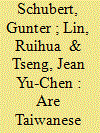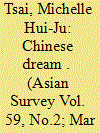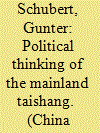| Srl | Item |
| 1 |
ID:
155207


|
|
|
|
|
| Summary/Abstract |
This article applies the “strategic group” concept to Taiwanese entrepreneurs (taishang), who have businesses in both Taiwan and Mainland China, to analyze their political agency in safeguarding their collective interests. Based on extensive fieldwork, the authors look at taishang collective action in both formal and informal settings to assess whether the taishang can be considered a strategic group in contemporary cross-Strait relations.
|
|
|
|
|
|
|
|
|
|
|
|
|
|
|
|
| 2 |
ID:
164970


|
|
|
|
|
| Summary/Abstract |
Starting from Xi Jinping’s political initiative the Chinese Dream, this paper examines its capitalist and nationalist discourse constructed through the nation’s disciplinary system, and seeks to unravel how it is enmeshed with business operations in mainland China. The paper argues that Taiwanese businesspersons play an ambiguous role in the dream as both “foreign” and “Chinese” investors.
|
|
|
|
|
|
|
|
|
|
|
|
|
|
|
|
| 3 |
ID:
119215


|
|
|
|
|
| Publication |
2013.
|
| Summary/Abstract |
After more than half a century's separation, interaction between China and Taiwan has increased and has progressively changed from a politico-economic interaction to a more civic interaction. Scholars working on cross-Strait relations have recently begun to pay attention to the civic influence of Taiwanese businesses on the relationship. Some emphasize the importance of sub-governmental interactions in the process of cross-Strait integration. Others assert that Taiwanese businesses can exercise economic leverage to constrain the Chinese government in cross-Strait policymaking. These scholars stress bottom-up processes by observing current phenomena, then deducing the emerging pattern of cross-Strait relations that may be influenced by business activities. Taking account of changing trends in scholarly discussions of the cross-Strait relationship, this special issue of China Information presents current research in this field. Unlike studies on top-down processes that affect political and economic interactions between China and Taiwan, several contributions in the special issue highlight bottom-up mechanisms affecting such interactions by examining the identity of Taiwanese businesspeople and migrants, as well as the activities and implications of Taiwanese charitable organizations operating in China. This issue focuses not only on the impact of China on Taiwan, but also the impact of Taiwanese investments, migrants, and exports on Chinese society.
|
|
|
|
|
|
|
|
|
|
|
|
|
|
|
|
| 4 |
ID:
095667


|
|
|
|
|
| Publication |
2010.
|
| Summary/Abstract |
This article explores the political thinking of Taiwanese business people (taishang) and factory managers (taigan) on the Chinese mainland by drawing on qualitative data gathered between 2006 and 2008 in the Pearl River Delta and the Shanghai/ Kunshan metropolitan area. An ideal type of taishang is constructed to explain the major features of their identification with Taiwan, their perspectives on cross-Strait relations, their integration in Chinese society and their self-assessment as political actors in the shaping of cross-Strait relations. An important finding of this study is that the taishang is a rather apolitical figure who does not see much leeway to develop autonomous political leverage. However, this may change gradually as cross-Strait relations have eased significantly since the Kuomintang (KMT) (Guomindang) came to power in mid-2008 and the governments in Beijing and Taibei have experienced a rapprochement.
|
|
|
|
|
|
|
|
|
|
|
|
|
|
|
|
| 5 |
ID:
137543


|
|
|
|
|
| Summary/Abstract |
This article investigates the cinematic representation of Taiwanese businesspeople’s (taishang 台商) family relations in China, and the concomitant transformation of homeness. The emergence of Taiwanese enterprises in China began in the late 1980s, and the attendant migration has resulted in the separation of families and a change in women’s roles as their husbands travel between Taiwan and China. This article sheds light on how documentary film portrays cross-Strait migration, as seen through the lens of taishang wives. Two documentary films – Chang’e’s Monthly Visit (嫦娥月事, 2003) and A Wife’s Stage (太太的舞台, 2003) – respectively produced by Taiwanese and PRC filmmakers are discussed to demonstrate the transformation of women’s roles within the domestic sphere and the reinvention of homeness. Homeness is used as a trope of representational politics on both sides of the Taiwan Strait, and as a site of cultural production impacted by migration. This article argues that in Taiwanese documentary filmmaking, home is associated with the split family structure through the portrayal of wives as subordinated victims, whereas PRC filmmakers present China as an ideal and harmonious homeland.
|
|
|
|
|
|
|
|
|
|
|
|
|
|
|
|